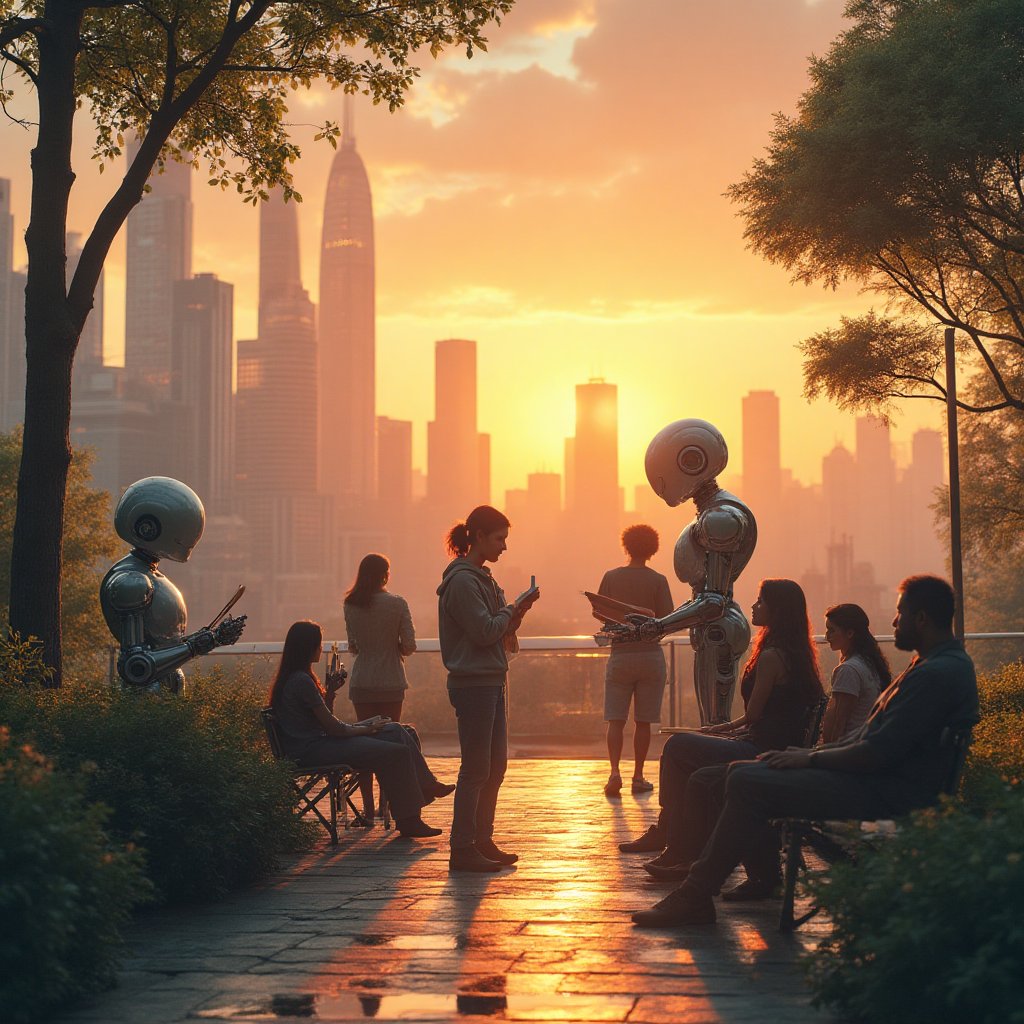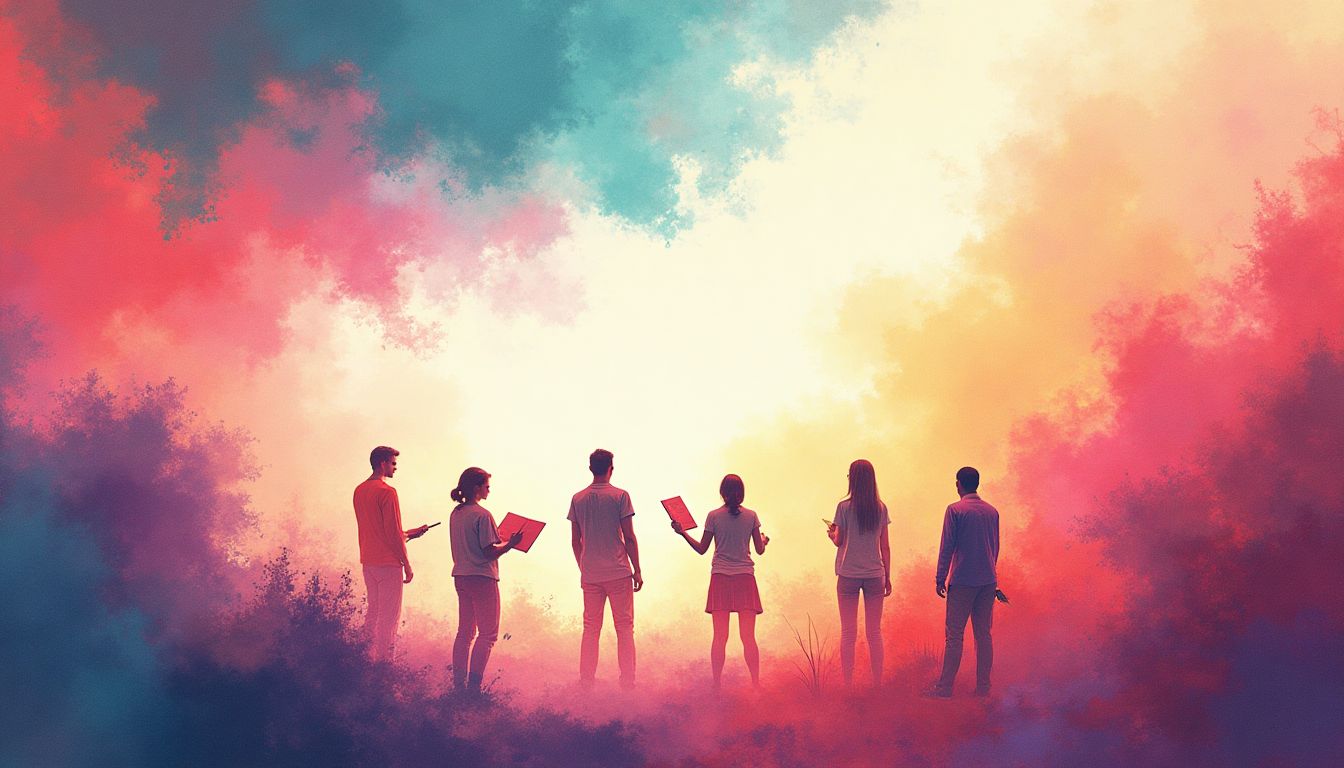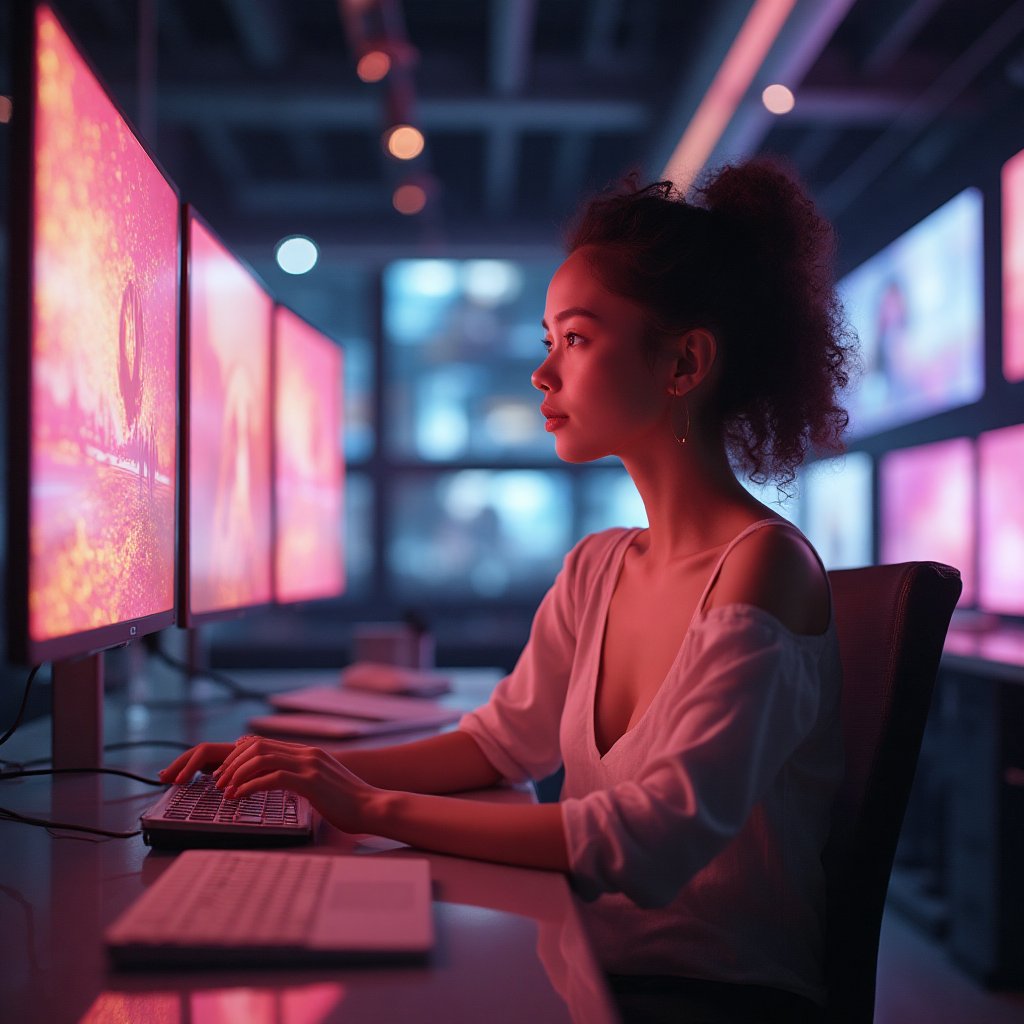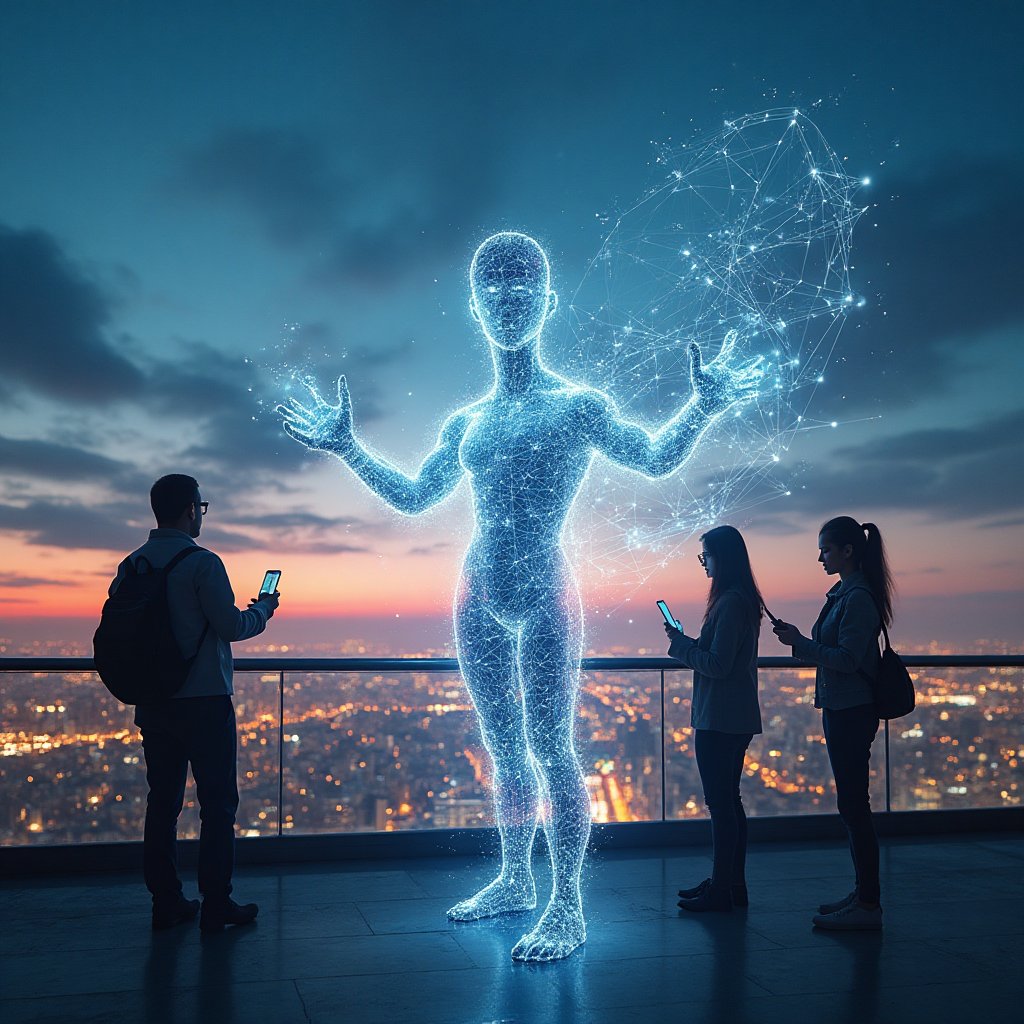Introduction: Reimagining Existence
Man is the only creature who refuses to be what he is. – Albert Camus How often have we chased after the idea of self-discovery, only to trip over our own shoelaces, tumbling into the mundane routine of everyday work-life? Camus sparks a profound thought here—humans are restless beings who yearn for transformation. As artificial general intelligence (AGI) makes its grand entrance on the stage of human ingenuity, society stands at the brink of an exhilarating transformation, reminiscent of a Renaissance. Will AGI free us from the nine-to-five grind, offering us the chance to redefine purpose? Perhaps the once-faraway dream of a life without work is hovering just around the corner, like a mystical door creaking open, inviting us to rediscover ourselves and each other.
Visionaries like Yuval Noah Harari, Ray Kurzweil, and Elon Musk have painted vivid portraits of this emerging reality, where the boundaries of what it means to be human are stretched and reconfigured. Liberated from the shackles of traditional work, individuals could embark on soulful journeys, unraveling the mysteries of existence. The possibility that an AI-driven world could lead to an enriching odyssey of creativity, connection, and meaning is a tantalizing thought, urging us to rethink our lives beyond spreadsheets and clock-ins. By unbinding the potential of AGI, we take a giant leap toward answering that ageless question: What should we live for?
Embracing Freedom: The End of Work
The dawn of AGI marks an era where, as if by magic, the notion of "work" as we know it could fade like morning mist. This unprecedented shift isn't just about robots taking on tasks; it's the beginning of a societal metamorphosis that reads like a plot twist in a sci-fi novel. The nature of work, as outlined by Karl Marx and further explored by thinkers like David Graeber, is deeply etched into our identity, but AGI turns that script on its head.
Historically, work has been seen as a necessary evil, a means to an end. Hunting and gathering were replaced by farm work, which morphed into industrial tasks; it's evolution with a capital "E". But imagine a world where the hustle and bustle of work is no longer a defining feature of adulthood. As we face this tantalizing prospect, a pivotal question arises: When work becomes unnecessary, what becomes of our societal identity?
The transition to AGI-powered freedom could invoke psychological and societal changes akin to shifting tectonic plates, as traditional roles loosen their grip. Without the typical paths we cling to for identity, society might blossom into something new, much like a caterpillar transforming into a butterfly. While a world without work seems to promise liberation, it also presents uncharted emotional landscapes. AGI's gift of time could be seen as a chance for a second childhood—a period of exploration and play. The true challenge will be redefining our intrinsic purpose beyond the cubicles and assembly lines, finding our unique place in this brave new world.
The Quest for Meaning in a Post-Work Society
Can you imagine a world where your job doesn't define you? Where cocktail party chatter isn't dominated by "What do you do for a living?" but by "What makes you tick?" Without the badge of a job title, we suddenly face the biggies: Why are we here? What's the point of it all? As AGI opens up a post-work playground, we're invited to a grand existential potluck, and guess what? You get to bring the main dish!
Philosophical Perspectives
Diving into this philosophical soup, we find thought leaders like Aristotle with his idea of eudaimonia, the concept of a flourishing life or Nietzsche's take on creating one's own values in the chaos of existence. Humans, freed from the drudgery of daily work, might gravitate towards these perspectives, carving out a life of value and purpose, not centered on labor, but on inner fulfillment and personal invention.
Creating Personal Narratives
Listen, we've all heard the "find your passion" TED talks, right? But what happens when you actually have the time to do just that? AGI gives us the ultimate backstage pass to our own stories, full of character development and plot twists. Just like Frodo in The Lord of the Rings or Simba in The Lion King, we have an untapped potential to find our narrative. Will you be the hero, the healer, the dreamer, or maybe the villain in your own tale?
The Renaissance of Art and Creativity
Picture a world without snooze buttons or alarms. No 'just one more email' before midnight. What fills the void? Glitter, glue, and creativity! No longer tethered to the inbox, we might just unleash our inner Picassos, weaving rich tapestries of music, literature, and art. The muse is back, and she's here to party!
The Role of Technology in Art
Technology and art have been frenemies forever, haven't they? Remember when photography was going to kill painting? Or YouTube was going to obliterate television? Yet here we are. With AGI in town, tech is no longer just a tool but a collaborator. A new symphony arises when paintbrush meets processor, when canvas meets code. Human ingenuity and digital precision create art forms that DaVinci couldn't have dreamed of.
Collaboration Between Humans and Machines
It's like Buddy Cop Movies minus the crime! What happens when Van Gogh teams up with an AI assistant like Google's AI poet? Magic? Maybe. Abnormal levels of paint splatter? Likely. This collaboration opens a world where creativity knows no bounds; where every "happy little accident" (Bob Ross winks from his cloud) is enhanced by algorithms, leading to art forms previously unimaginable.
Strengthening Human Connections
In a world transformed by AGI, the value of connection might shine brighter than ever. As individuals liberate themselves from the chains of relentless schedules, they can truly savor the essence of friendships, family, and community. Prioritizing human bonds could foster a tapestry of relationships that nurtures and uplifts. But how might we bridge the gaps left behind when the workspace no longer serves as a social anchor?
The Science of Relationships
Diving deep into the fabric of human interaction uncovers a fascinating truth: our species thrives on social connections. Psychological studies and research suggest that meaningful relationships can significantly enhance well-being and life satisfaction. Researchers at Harvard University have long emphasized the importance of relationships in cultivating happiness. Consider this: when the noise of endless tasks quiets, and we stand face-to-face, future legacies might be penned not through isolated success but profound, interconnected experiences.
- Heartfelt connections: Genuine bonds can stave off loneliness and isolation. Studies have shown that a strong sense of community can reduce stress and promote overall mental health.
- Communication: Building empathy and active listening skills, once honed through shared projects, will take center stage. Having more time allows us to prioritize nurturing these skills.
- Shared goals: Without the binding element of work, shared activities and community projects could introduce new social structures that keep individuals engaged.
New Forms of Social Structures
Imagine bustling hubs where arts, sports, and project screens replace cubicles. Societies may pivot towards creating community-driven sources of identity. No longer defined solely by career milestones, individuals in a post-work world may explore diverse roles that add layers to their identity outside traditional norms. Today, it is not far-fetched to foresee an amalgamation of collaborative, engaging social arrangements thriving in self-discovery-friendly environments.
Some future-minded thinkers predict potential for:
- Grassroots movements: Communities may initiate projects that address local issues while fostering camaraderie.
- Skill-exchange programs: Passionate amateurs might swap skills in peer-led spaces, rekindling a love for learning.
- Co-living arrangements: Communal housing complexes could build supportive communities where residents share resources and experiences.
Although rethinking conventional paradigms might stir skepticism, the prospect offers hope. By envisioning adaptive social landscapes, we can weave a tapestry where each thread interlaces purpose and personal bonds.
The Challenges of Transitioning to a New Era
The picture of a post-work utopia is indeed alluring, yet any revolutionary transition bears the burden of emerging challenges. While the dream of an AGI-liberated society holds immense promise, it's crucial not to turn a blind eye to potential hurdles but instead, to approach them with foresight and agility. So, what roadblocks lie ahead as we try steering the ship toward this invisible horizon?
Economic Implications
The ominous chasm of economic disparity may be the first to surface as traditional jobs gradually wane. An economy once driven by workforce contributions must pivot to new models of value creation. As countless job roles become automated, potential income imbalances risk widening the gap between different social classes. Devising equitable economic solutions may shield countless families from financial uncertainty.
Consider these potential economic strategies questioned yet necessary:
- Universal Basic Income (UBI): As pioneered by thoughts from figures like Andrew Yang, UBI aims to provide all individuals with a stable income floor, fostering financial security and supporting exploration beyond work.
- Reskilling investments: Facilitating training programs for individuals to adapt industry-relevant skills ensures future readiness.
- Tax incentives: Encouraging entrepreneurship and innovative community ventures via tax-based support could bolster economic growth.
Mental Health Concerns
Advancing into uncharted domains may evoke dilemmas within the human psyche. For some, freedom from routine could paradoxically spark distress. Imagine losing the comforting patterns of everyday labor, structure fading from contemporary life. Such transitions pose risks, from identity shakes to mental health challenges. Navigating fresh roles demands perspective shifts that counter potential anxiety and feelings of worthlessness.
- Establish identity anchors: Cultivating passions and personal goals that offer purpose and structure serve as psychological lifebuoys as traditional work fades into the background.
- Create support networks: Online and offline networks offering communal wisdom and support can strengthen resilience and personal growth.
- Emphasize mental wellness: Checking habits, seeking therapy, and employing digital wellness tools provide buffers which ensure mental stability.
Navigating this transformative voyage lays the groundwork where resilient systems prepare the mind and economy for change. Only by addressing every ripple of societal impact can we truly realize the next chapter of human potential, fortified by technology yet anchored in purpose.
AI Solutions: How Would AI Tackle This Issue?
As we stand on the brink of a new era marked by AGI, it's essential to consider how artificial intelligence can support humanity's transition towards a more liberated existence. Implementing thoughtful AI solutions will play a pivotal role in creating a society that values self-discovery and human connection. Here are some strategies to harness AGI in our favor.
Step 1: Establishing Open-Source Platforms
Create collaborative platforms that allow individuals to explore creative avenues and express themselves freely. These platforms should be open-source to encourage participation and innovation from a diverse range of users. Initiatives like GitHub have shown us the potential of open-source collaboration. Imagine a space where artists, writers, and thinkers from all corners of the globe can come together to share ideas, projects, and inspirational content. This community model would empower individuals to explore their passions and develop unique creative identities.
Step 2: Protecting Mental Health with Digital Wellness
Implement AI-driven tools to monitor and enhance mental health while promoting meaningful engagement. Drawing from successful apps like Headspace, we can develop applications that help users cultivate mindfulness, self-reflection, and empathy. By integrating these features into platforms designed for creative expression and interaction, we can create a digital ecosystem that prioritizes well-being. Such technology could remind users to engage in healthy behaviors, like scheduled breaks or reflections based on their activity levels and emotional states.
Step 3: Educational Reformation
Revolutionize education with a focus on self-discovery, ethics, and collaboration, encouraged through interdisciplinary studies. Education needs to shift from purely academic achievement to fostering creativity and critical thinking. Institutions like Edutopia can serve as a guiding force in this effort, promoting innovative teaching methods and inspiring educators to integrate emotional intelligence into their curriculums. AI can personalize learning experiences based on students' interests, making education more engaging and relevant.
Step 4: Community Models
Design AI-driven community models that actively promote social engagement and address mental health. We can learn from initiatives like Meetup that foster real-world connections based on shared interests. By utilizing AGI, we can create community platforms that suggest events, gatherings, and discussions tailored to users' passions and preferences. These platforms should also facilitate mentorship opportunities, leveraging the wisdom of experienced individuals to nurture the next generation.
Step 5: Ongoing Assessment and Adaptation
Finally, utilize continuous evaluation mechanisms to adapt strategies effectively. As seen in projects like the NASA Mars mission, the continuous feedback loop drives success. It is essential to implement data analytics that allows for the assessment of the impact of AGI solutions on society. Regularly gathering data from AI-driven platforms will help map trends and adapt programs to meet the evolving desires and needs of the population.
Conclusion: Embracing the Unknown
The dawn of AGI offers humanity a once-in-a-lifetime chance to redefine who we are and what it means to be alive. With the potential to liberate us from the shackles of monotonous work, we stand poised at the edge of a new landscape rich with opportunity for self-discovery and flourishing creativity. In this unique moment in history, we have the chance to cultivate deep connections, embark on profound journeys of learning, and revel in the beauty of human expression. We must embrace this metamorphosis with courage, forging new pathways that honor our collective potential. However, the challenges are real, and navigating this transition will require resilience and adaptability. The questions ahead are daunting yet exhilarating: How will we reshape societal norms? What roles will technology play in enriching human experience? Ultimately, the journey lies within our hands, and the choices we make today will resonate across generations to come. Let's embrace the unknown together, igniting a renaissance in our shared human adventure.
FAQ
1. What is AGI?
AGI, or Artificial General Intelligence, refers to a type of computer intelligence that can perform any intellectual task a human can do. Unlike regular AI that is designed for specific tasks, AGI has the ability to learn, understand, and apply knowledge across a wide range of activities. It’s like having a super-smart robot buddy that can help us with almost anything!
2. How will AGI impact employment?
AGI is expected to change how we work by taking over some jobs that people currently do. This change could lead to fewer traditional jobs, but it might also open up new opportunities. Here’s a simple breakdown:
- Current jobs may be automated.
- New fields or industries could be created.
- People might focus more on creativity and personal interests.
As we rethink work, we might find more meaningful ways to contribute to society.
3. Can AGI facilitate self-discovery?
Absolutely! AGI could work as a helpful tool to aid us in exploring who we are and what we want in life. It can offer ideas, tools for creativity, and even recommend experiences based on our interests. Imagine having a teacher, a coach, and a friend all rolled into one!
4. How might mental health be affected in a post-work society?
The absence of traditional work could bring both good and bad outcomes for mental health. On the one hand, people might feel freer and have more time to explore hobbies and passions. On the other hand, some individuals may struggle with losing their job's structure and purpose. It's important to build a supportive community to help everyone through these changes.
5. What can we do today to prepare for this shift?
To get ready for a future with AGI, we can take small steps now:
- Engage in discussions about AGI and its implications.
- Explore what you love to do and dive into new hobbies.
- Build connections with friends and family, focusing on quality time.
These actions will help us adapt as society evolves with AGI.
6. Will AGI replace human interactions?
While AGI can help us connect in new ways, it shouldn't replace human interactions. Think of AGI as a helper that makes it easier for us to communicate and collaborate. Real friendships and relationships bring joy and fulfillment that machines simply can't replicate.
7. What role will education play in a world with AGI?
Education will become even more important, focusing on teaching emotional intelligence, creativity, and collaboration. Schools may be transformed to help nurture abilities that can't easily be automated. If we want to thrive in a world with AGI, we'll need to keep learning and growing throughout our lives!
8. What social changes might we expect in a post-work society?
As work becomes less central to our lives, we may notice some interesting changes in our communities:
- People might form tighter-knit groups focused on shared interests.
- New cultures around creativity and collaboration could emerge.
- Many might take on volunteer roles, filling the gaps left by traditional jobs.
These shifts could lead to a more connected and vibrant society!
9. How can we ensure fairness as AGI changes society?
It's important to look out for everyone as we transition to a society with AGI. We can work towards fairness by:
- Implementing policies that protect everyone's rights.
- Creating educational programs that prepare everyone for new jobs.
- Encouraging diverse voices in discussions about AGI.
With careful planning and consideration, we can strive for a more equitable world.
10. What do we hope to achieve in the future with AGI?
Overall, we aim for AGI to help unlock human potential. Our goals include:
- Enhancing creativity and innovation.
- Improving our understanding of ourselves and each other.
- Creating a more fulfilling and connected society.
The journey towards AGI is about discovering more about what it means to be human in a rapidly changing world.
Wait! There's more...check out our gripping short story that continues the journey: The Last Hope of Orion Colony
Disclaimer: This article may contain affiliate links. If you click on these links and make a purchase, we may receive a commission at no additional cost to you. Our recommendations and reviews are always independent and objective, aiming to provide you with the best information and resources.
Get Exclusive Stories, Photos, Art & Offers - Subscribe Today!





























Post Comment
You must be logged in to post a comment.